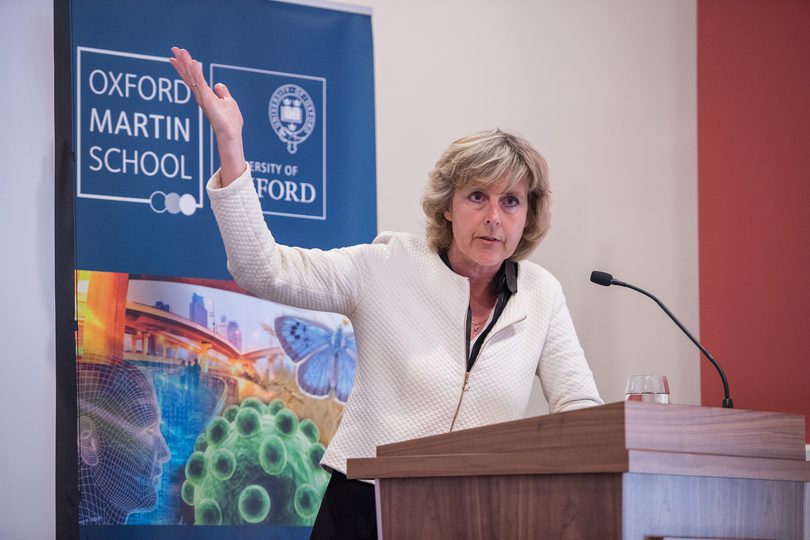
In six months’ time, leaders from around the world will meet in Paris with the aim of reaching an agreement on cutting carbon emissions. Ahead of her lecture at the Oxford Martin School on Monday, the former European Commissioner for Climate Action, Connie Hedegaard, told the school’s communications officer Sally Stewart why she was optimistic about the negotiations, and how everyone must play a part in preventing dangerous climate change.
“There are so many strong interests in getting an agreement in Paris so I’m not that concerned,” says Connie Hedegaard. From the ‘nightmare’ of the 2009 UN Climate Change Conference in Copenhagen, to her achievements pushing through a timetable for new negotiations in Durban in 2011, she knows not only the realities but also the possibilities offered by negotiations of this scale. What she is also acutely aware of is the fact that once the curtain goes down on the Paris conference of parties (COP), the real work begins. “We have to have a mix of top down and bottom up. We can have the finest international treaty in the world but that doesn’t produce anything. We’ve got to have the action.”
A core question, she says, is whether what comes out of Paris has to be binding or not. “In Europe we have a tradition of binding agreements. With China they will normally say if it’s in their five year plan it is going to become part of legislation. But what about the US? One year after Paris they will be changing presidents. If we do not find a binding formula what kind of reassurances will the world have from the US? Small states will want to know the answers to these questions before leaving Paris.”
And what of the efforts of non-governmental organisations in tackling climate change and cutting emissions? With global negotiations in many areas often resulting in either in gridlock or slow progress, there are calls to consider other ways to drive action on emissions, but Ms Hedegaard remains confident that a global accord remains the best hope. “Regions and cities are doing things, we have C40 and many other initiatives, and that’s all very good. We’ve also seen some progressive businesses moving forward. But in order to get to the scale we need, with the speed we need, I still believe one shouldn’t underestimate what it means to have an overall framework agreed.
“I know from my own experience as minister in government that it comes at a political price if we don’t live up to our promises. Progressive businesses will say they’re running ahead but the world is much bigger, and we shouldn’t underestimate what it takes to move the bulk. If people can see that their competitors aren’t being forced to do something, they will be reluctant. That’s why I think this overall framework matters. There’s a paradox: people will say ‘we can do it ourselves’ but they will sit totally passive waiting for an international agreement to happen before they will do anything. We will get closer to the ambitious level we need if people can see that everyone is being forced to do something.”
A key development that has given Ms Hedegaard hope for Paris is the announcement last autumn of a joint US-China commitment to reducing emissions. “For the first time ever, the presidents of China and the US said ‘We have responsibility’. That’s been a big obstacle for many years, and it means this will be very different to Copenhagen. And that’s what changed in Durban, that new economies have responsibility. The dynamic is changing and this should give us a decent prospect of having a good deal in Paris.”
What could strengthen future prospects for action even further, she says, is working to raise awareness among all nations, including African and low-lying island states, of investment in renewable energy and the opportunities it presents for them. “Now is an ideal time for phasing out fossil fuel subsidies as oil prices are going down. Many economic institutions have seen that this is basically about changing our whole growth model, and if that could become somewhat more visible and tangible before Paris, it would help getting core agreements. Everyone knows what’s at stake and can see where the contours of a compromise lie. But to really get the transition we need a whole package, including things that bring a low-carbon strategy into the core of our economy.
“In that sense, where business can really help politicians is making a business case visible. And cities can help by highlighting the core benefits. If we have low-carbon transport in China we get purer air, lower health costs. That’s also where academic society can help. To address climate change we have to be cross cutting across all sectors. Academics need to be truly inter-disciplinary, looking at co-benefits and the issue of divestments. We really need help from the scientific community to make sure their findings are known by policy makers. There’s a job for everyone here to get things to move forward.”
Despite 2014 being the hottest year on record, Ms Hedegaard says there are good news stories out there, including stabilisation of emissions despite 3.7 per cent growth in global GDP, and the fact that more renewable energy capacity was installed in 2013/14 than fossil fuel. “If you’re looking closely it can be hard to see if more profound changes are happening,” she says. “But these changes indicate that something is starting to happen out there.”
- Watch the video of Connie Hedegaard's 'Inside climate negotiations' lecture
- View images from Connie Hedegaard's lecture